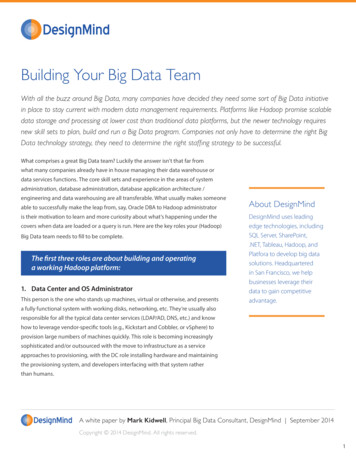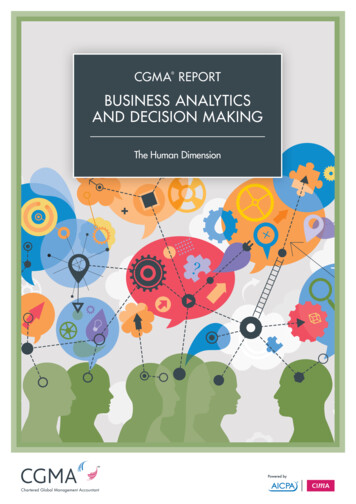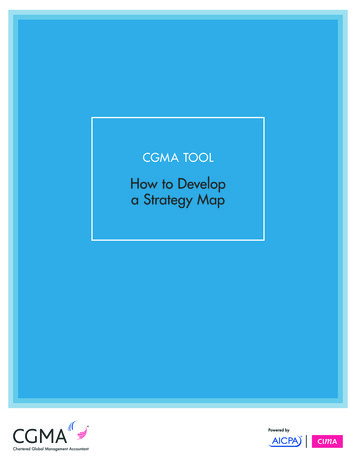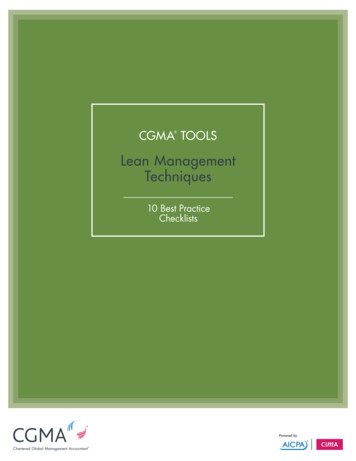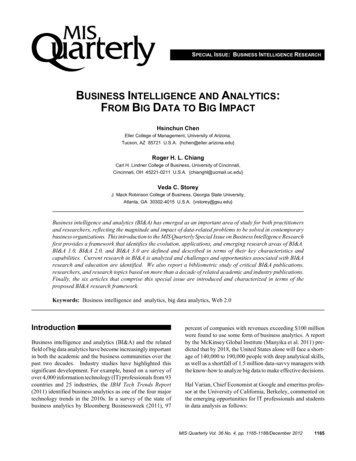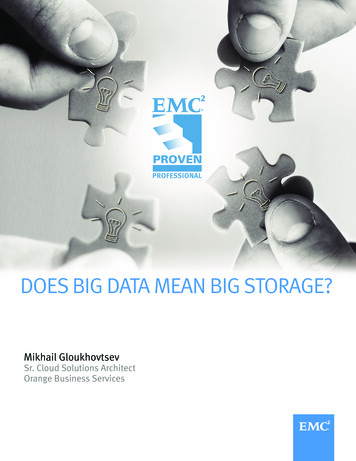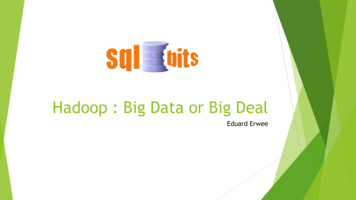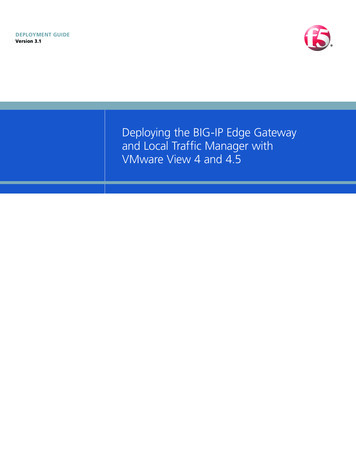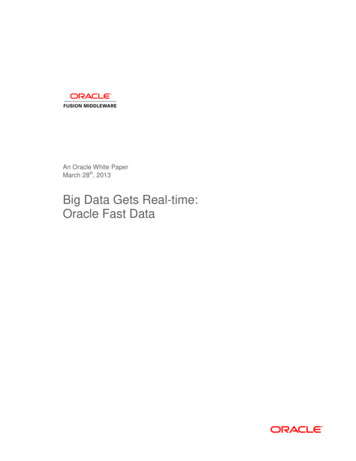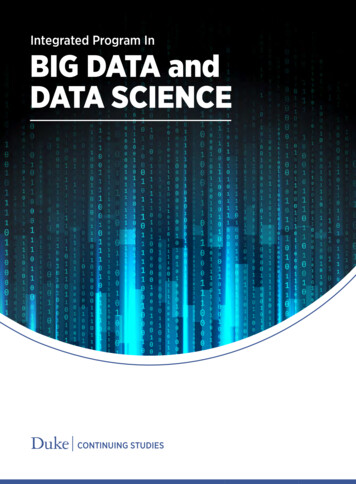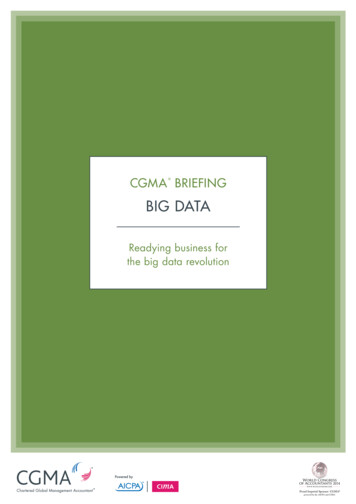
Transcription
CGMA BRIEFING Big DataReadying business forthe big data revolutionProud Imperial Sponsor: CGMA powered by the AICPA and CIMA
Two of the world’s most prestigious accounting bodies, AICPA and CIMA, have formeda joint venture to establish the Chartered Global Management Accountant (CGMA )designation to elevate and build recognition of the profession of management accounting.This international designation recognises the most talented and committed managementaccountants with the discipline and skill to drive strong business performance. CGMAdesignation holders are either CPAs with qualifying management accounting experienceor associate or fellow members of the Chartered Institute of Management Accountants.
ContentsIntroduction 2Business benefits from data 4The data competencies businesses need 5Management accountants: ready for big data 7Developing the CGMA’s business partnering skill set 9Conclusion 101
IntroductionBusinesses and management accountants are always on the lookout for the nextbig thing – and big data is already making big changes in many sectors.A business must strive to balance cost containmentwith investment to develop its competitiveposition. Striking this balance requires a keenunderstanding of the drivers of cost, risk andvalue in the business. Management needs betterinformation. Developments in the use of data arerevolutionising management, providing the insightsneeded for better decision making and performancemanagement. Some early adopters in the useof big data and advanced analytics have alreadyenhanced both their operational performanceand their competitive position.Ensuring that data is harnessed to inform decisionsimproves performance. Companies that haveembraced the opportunities offered by developmentsin data are three times more likely to rate themselvesahead of their peers in financial performance.1For example, the Intercontinental Hotel Groupimproved operational and strategic decision making.Intercontinental built a data platform that makesuse of a wide range of both internal and externaldata to improve operational reporting and customerservice. They are now better able to predict guests’purchasing patterns and they can proactivelyidentify market trends to guide investment. 2Yet a survey of over 2,000 finance professionalsconducted by CIMA and the AICPA found that86% of organisations are struggling to get valuableinsights from their data. 32Big dataReady for big data?Nearly 9 in 10 organisations arestruggling to get valuable insightfrom dataManagement accountants have an important roleto play in ensuring business success in today’sdata-driven era. They also need to stay abreast ofdevelopments to ensure continuing career success.This briefing provides an overview of thecompetencies businesses must develop, key rolesmanagement accountants can play and the skillsthey will need.
How big data is driving big changes across sectorsFarmingTractors with sensors can collect data on seeding rates, crop yield and groundconditions for more accurate prediction of production rates.4ManufacturingAdvanced analytics are used to manage the risk of potential faults in equipment andproduct anomalies as well as forecasting, inventory management and production planning.5RetailForecasting customer demand and understanding preferences is enabling retailersto be more proactive and to create new digital product offerings.6TransportationPredictive analytics are used to manage costs through preventative maintenancescheduling, inventory parts management and warranty claim management.7 Airlinesuse analytics to understand the customer, predict demand and optimise prices.8TelecommunicationsAnalytics and big data are helping providers to reduce customer acquisition costs,segment target subscriber audiences and rank prospects by propensity to buy.9Financial institutionsBanks and insurance companies are using predictive analytics software for fraud analysis,10while credit card companies use analytics to manage credit lines and collections.11CitiesAdministrators use big data to understand citizens’ needs and plan for future needsin transport, policing, healthcare, etc.12EducationData from student tests and assessments determine patterns and performance levels,helping to adapt courses and teaching methods.13HealthAnalytics are used to identify high-risk patients and simulate patient reportedoutcomes (PROs) for care quality improvement.143
Business Benefits from DataBusinesses across different sectors are using data, whether to improve the efficiency of theiroperations, for more strategic purposes, or even as the basis of their business model.Major customer-facing businesses accumulate anduse data to inform market segmentation, pricingstrategies, capacity planning, fraud prevention and tooptimise promotional and advertising expenditure.Businesses which do not deal directly withconsumers do not have the same access to consumerdata. Fast-moving consumer goods companies suchas Diageo and Unilever analyse operational datato improve the efficiency of their manufacturingprocesses. They also use public data and buy indata from outlets, distributors and syndicateddata suppliers to inform their marketing decisions.They can engage directly with customers throughthe internet and social media, developing brandloyalty and gaining data that can yield insights intoconsumer behaviour.While smaller businesses may not generate largevolumes of data, they can access free public data sets.Many businesses offer data services that can be used,for example, to identify the best location for a newoutlet or to enable targeted marketing initiatives.The advanced operating and accounting systemsonce used only by big businesses are now availableeconomically as cloud-based solutions. Through usingthese systems, small businesses too are accumulatingdigital data about their customers and operations.Data is the basis of the business model of manyglobal internet businesses – including internetservice providers (ISPs), search engines and socialnetworks – that offer free value propositions toconsumer audiences. These attract traffic thatgenerates data which has value for a businessaudience.There are also opportunities for smaller-scaledata-enabled business models, including dataprovision, analytical and consulting serviceswhich allow other businesses to benefit fromdevelopments in data.There is much hype about new data-enabledbusiness models, and the potential to explore newforms of big data to derive new insights or ‘unknownunknowns’ about customer behaviour. For mostbusinesses, the higher priority is to get better atinterrogating the more readily accessible enterprisedata on their systems. This is needed to report whatthey must monitor, in order to manage strategicprogress and operational performance or ‘knownunknowns’. But to benefit from data and its analysis,businesses need to develop new competencies.Examples of business benefits· Driver-based forecasting and performancemanagement· Advertising and promotional spend: improvingmessages and channel effectiveness· Customer segmentation to improve focus andincrease revenues· Improved website design based on visitorbehaviours· Improved process efficiency and productquality· More effective employee recruitment andretention· Logistics: tracking shipments, improving routes,supply chain management· Selling data or analysis services· Understanding customers’ needs andidentifying opportunities to innovate4Big data· New business models
The data competencies businesses needA business needs to have the right data, the ability to analyse it, a culture where the useof data is expected and the skills to ensure that insights are applied to create value.This requires talent development. The competenciesrequired span from technical ability to commercialacumen (see figure 1). They also span fromperformance management to the abilities needed toensure conformance to data management standardsand the business’s data policies.Data managementData analyticsCustomers must also have confidence that theirpayment records, contact details or any sensitivedata are handled properly and maintained securely.Business managers will also be concerned thatcommercially-sensitive data is not vulnerable tocyber attack.The scale and complexity of the data sets nowavailable often require a data scientist’s advancedlevels of analytical skills for data mining, derivingalgorithms and predictive analytics. A report fromleading business analytics software provider SAS15has highlighted the shortage of these skills. In thefuture, however, advanced data skills may not alwaysbe necessary to conduct complex analysis. Newsoftware, such as data visualisation tools, may enablebusiness users to analyse data on a self-service basis.Meanwhile, forming centres of excellence,automating repeated analysis and providingmanagers with self-service tools for less advancedanalysis are necessary steps if data scientists’ scarceexpertise is to be used efficiently.Figure 1: The range of data competencies whicha business must nalyticsPERFORMANCECONFORMANCECOMMERCIALData integrity is essential, so businesses need toensure their systems and processes capture relevantdata correctly, first time, and store it accessiblyfor consistent use in subsequent interactions withinternal users, customers and other stakeholders.As data is captured and managed on systems, suchdata management needs are usually within the ITprofessional’s area of technical expertise.Data cultureLeading companies are using big data to outperformtheir peers. Evidence is growing to suggest leadingusers of big data are achieving higher returns thantheir competitors.16To benefit from developments in data and analytics,a business must develop the necessary culture ofstewardship and accountability whereby decisionsare based on evidence and the business is managedin the interests of stakeholders. Data should bevalued as an important strategic asset for improvingthe competitive position or enabling new strategies.A business also needs the ambition to use its dataand to be innovative. It must be prepared to developnew strategies and make acquisitions to acquire newcapabilities or revise its business model.Value creationTranslating analytical insights into commercialinsights and achieving impact requires collaborationbetween IT professionals, data scientists, financeprofessionals and business managers. The businessacumen to identify an opportunity for creating valueis also important.TECHNICAL5
Relevant data is needed to measure and manageintangibles such as customer relationships, humancapital and intellectual property. These are the basisof a business’s potential to generate value.17New strategic insights into opportunities to generateextra revenue may get more attention, but managersneed to be alert to other sources of value such asincreasing efficiency, reducing risk, generatingprofitable sales and improving cash flow. Oftenmore significant is the cost leadership that drivesincremental innovation and continuous improvementin the efficiency of business processes.Talent for dataBusinesses must attract, develop and retain thoserare individuals with advanced data analyticsskills, providing the working conditions, tools andchallenges that they value. However, data scientistsare unlikely to have a practical understandingof business operations. Analytical insights are ofno commercial value unless other professionalson the business team provide the wider rangeof competencies necessary to benefit from thesedevelopments in data and its analysis.6Big dataMcKinsey18 predicts a significant shortage ofadvanced analytics talent but an even largershortage of managers and analysts with the skills tounderstand and make decisions based on the data.They also predict the need for “translators” whocan work with IT professionals, data scientists andbusiness managers to interpret analytical insightsand convey them as commercial insights in terms thebusiness can understand and implement.
Management accountants: ready forbig dataBig data is part of a wave of digital technology which has the potential to threatenmany highly skilled roles.19 For example, it has become easier and faster to identifypotential fraud or diagnose an illness without human input.““The United States alone faces ashortage of 140,000 to 190,000 peoplewith analytical expertise and 1.5 millionmanagers and analysts with the skills tounderstand and make decisions basedon the analysis of big data.Big Data: The Next FrontierMcKinsey Global20An SAS report, 21 identified that in the UK theuptake of big data analytics will more than doublein large organisations. The finance department isthe most likely after the IT department to beresponsible for big data activity. In many businesses,finance and IT both report to the CFO or COO,necessitating management accountants to be alertto the potential inCOMMERCIALbig data and the roles they couldplay (see figure 2).CONFORMANCEAnalyticsData scientistData scientists are needed to meet the challengesof advancedData data analytics. The shortageData of dataManagerScientistscientists may seem like an attractive opportunity formore quantitative TECHNICALmanagement accountants. As theleaders in the financial planning and analysis arena,An important message for management accountantsis that they do not need to feel that the only wayto survive in a new era of digital data is to becomea data scientist. This is a highly specialisedand technical area that is not necessarily in themanagement accounting space.Data managerMany management accountants maintain a goodunderstanding of their business’s information systems.As trusted providers of accounting information,they have the professional disciplines necessary toensure data quality. They can contribute structureand credibility to data projects and they are oftenbest placed to articulate the needs of the business andFigure 2: Potent
analytics and big data are helping providers to reduce customer acquisition costs, segment target subscriber audiences and rank prospects by propensity to buy.9 Education Data from student tests and assessments determine patterns and performance levels, helping to adapt courses and teaching methods.13 Cities administrators use big data to understand citizens’ needs and plan for future needs .
